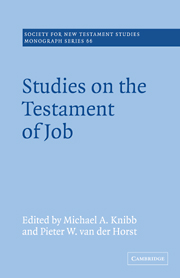Book contents
- Frontmatter
- Contents
- List of abbreviations
- 1 Introduction
- 2 The Testament of Job: a history of research and interpretation
- 3 P. Köln Inv. Nr. 3221: Das Testament des Hiob in koptischer Sprache. Ein Vorbericht
- 4 Zur Komposition und Konzeption des Testaments Hiobs
- 5 Images of women in the Testament of Job
- 6 Job's perseverance in the Testament of Job
- Index of passages
- Index of authors and subjects
6 - Job's perseverance in the Testament of Job
Published online by Cambridge University Press: 07 October 2009
- Frontmatter
- Contents
- List of abbreviations
- 1 Introduction
- 2 The Testament of Job: a history of research and interpretation
- 3 P. Köln Inv. Nr. 3221: Das Testament des Hiob in koptischer Sprache. Ein Vorbericht
- 4 Zur Komposition und Konzeption des Testaments Hiobs
- 5 Images of women in the Testament of Job
- 6 Job's perseverance in the Testament of Job
- Index of passages
- Index of authors and subjects
Summary
Introduction
Job's perseverance in the sufferings that Satan inflicts upon him is the main theme in chapters 1–27 of the Testament of Job. This is shown immediately in ch. 1: Job, just before his death as he looks back upon all the things he has gone through, says to his children that he has exhibited complete perseverance (1.5: …ἐν πάσῃ ὑπομονῇ γɛνόμɛνος). Apparently perseverance in suffering is Job's most characteristic quality. It is also mentioned in 4.6, 10, 5.1, 21.4, 26.4, 5 and 27.4, 7. These passages show that not only ὑπομονή and ὑπομένω, but also καρτɛρία and καρτɛρέω as well as μακροθυμία, μακρόθυμος and μακροθυέω are important words to denote Job's virtue. The last word occurs also in 11.10, 28.5 and 35.4, but in these passages it has a different meaning (see p. 129 below).
The purpose of this chapter is to investigate what perseverance in suffering in T. Job implies and against what background it has to be understood.
The vocabulary of perseverance in the Testament of Job
The three words for perseverance in T. Job are largely synonymous. Often two words are found side by side, and several times one word is taken up by another: see 26.4, 5, where Job uses μακροθυμέω immediately after ὑπομένω and also 27.4, where Job's καρτɛρία is mentioned, whereas in 27.7 he summons his children to μακροθυμία. This summons is based on the example of Job, who in 1.5 again calls himself a model of ὑπομονή.
- Type
- Chapter
- Information
- Studies on the Testament of Job , pp. 117 - 154Publisher: Cambridge University PressPrint publication year: 1990



